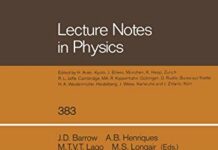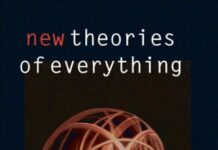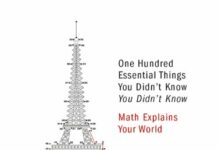
Ebook Info
- Published: 1992
- Number of pages: 317 pages
- Format: PDF
- File Size: 63.78 MB
- Authors: John D. Barrow
Description
John D. Barrow’s Pi in the Sky is a profound — and profoundly different — exploration of the world of mathematics: where it comes from, what it is, and where it’s going to take us if we follow it to the limit in our search for the ultimate meaning of the universe. Barrow begins by investigating whether math is a purely human invention inspired by our practical needs. Or is it something inherent in nature waiting to be discovered?In answering these questions, Barrow provides a bridge between the usually irreconcilable worlds of mathematics and theology. Along the way, he treats us to a history of counting all over the world, from Egyptian hieroglyphics to logical friction, from number mysticism to Marxist mathematics. And he introduces us to a host of peculiar individuals who have thought some of the deepest and strangest thoughts that human minds have ever thought, from Lao-Tse to Robert Pirsig, Charles Darwin, and Umberto Eco. Barrow thus provides the historical framework and the intellectual tools necessary to an understanding of some of today’s weightiest mathematical concepts.
User’s Reviews
Reviews from Amazon users which were colected at the time this book was published on the website:
⭐Very interesting book. Answers some of my questions, on how counting started and evolved.
⭐thank you
⭐A hard read but worth it.
⭐That may be a silly question. After all, most of us use counting and numerical calculations many times a day. However, the reading matter here digs below the surface, and asks such awkward questions. What is the nature of maths? Would there be any maths if there were no mathematicians?Starting with theories of counting, and the origins of methods of enumeration, John Barrow plunges headlong into the philosophy of mathematics. Perhaps the book ought to carry a health warning, for it should not be read accidentally. Readers need to have a grounding in some of the great mathematical movements, and discoveries. (Perhaps it is a bit judgmental to even use the word “discoveries”; are mathematical ideas invented or discovered? That topic is part of the subject matter).I liked the debate, but found the volume hard going. It is not the kind of book to read solidly from cover to cover. A great deal of re-reading is necessary, and picking it up on the train requires a conscious effort to remember what the current debate is about. Some of the arguments are very intricate for those of us who are not mathematicians.The work of some of the pillars of mathematics are described in varying detail, together with the triple crises that hit maths in the early years of the 20th Century. The optimism of Hilbert on the one hand, or Russell and Whitehead on the other was washed away by the work of Kurt Godel. The Austrian Godel, by the way, has been described as one of the most innovative minds of that century.There are some interesting insights into some of the characters from the history of maths. Leopold Kronecker did not believe in negative numbers. However, he had been a BANKER. How did he convince his customers that the problems caused by negative numbers (i.e. too little in their accounts) needed to be solved? There were also some disturbing questions raised by the work of Cantor on set theory. This gives rise to a wonderful paradox called “Hilbert’s Hotel”.As with many works on philosophy, it is not the answers that are important, it is the questions. Does the entity pi exist, even if there are no mathematicians. Is there really a universal ‘pi in the sky’, external to any human thought? You decide.Peter Morgan, Bath, UK (morganp@supanet.com)
⭐I have BA and MS degrees in Mathematics and Statistics, respectively. I have therefore spent some time debating whether Mathematics is discovered of invented. This book provide more food for thought on the subject. It’s a great read.
⭐Barrow, an astronomer at the University of Sussex when this book was published, provides an entertaining and informative account of the foundations and philosophy of mathematics. Do mathematicians invent or discover mathematics? What ‘reality’ do mathematical entities like pi have? What accounts for what physicist Eugene Wigner has called, in a now-famous paper, “The Unreasonable Effectiveness of Mathematics in the Natural Sciences” (299)? After an interesting account of the history of counting and numbers, Barrow discusses in succeeding chapters the philosophies of formalism, inventionism, intuitionism, and platonism, a sophisticated version of which he seems to favor. Perhaps most mathematical workers follow what Alfred Korzybski called “the ‘christian science’ school of mathematics, which proceeds by faith and disregards entirely any problems of the epistemological foundations of its supposed `scientific’ activities” (Science and Sanity 748). I commend Barrow because he considers these epistemological questions important and writes about them so engagingly. Barrow’s discussions of theories and personalities provide useful background for understanding mathematical foundations. As for Barrow’s conclusions, from a non-aristotelian view, the appeal of platonism seems understandable as an example of identification, the confusion of orders of abstracting. Barrow doesn’t seem to consider that mathematicians may both invent and discover mathematics. He seems so taken with the effectiveness of mathematics in the natural sciences that the notion of mathematical entities existing solely as high-order abstractions in human nervous systems seems insufficient to him. As Korzybski pointed out, we live in a world of multi-dimensional, ordered structures or relations. It does not seem unreasonable, then, that we can map this world with an exact language of relations, i.e., mathematics. But as Korzybski also pointed out many times, “the map is not the territory.”
⭐A popular treatment of the philosophy of mathematics (PoM) — not a book I imagine would jump off the shelves. Yet, what a gem this book is. For anyone not in the know about what some of the great intellectual debates in the realm of PoM are, Pi in the Sky offers a very solid, and endlessly interesting, overview. It’s not always an easy-going read, but it’s certainly one that rewards persistence. Barrow does a brilliant job of linking abstruse PoM arguments to other branches of philosophy (philosophy of mind and metaphysics for instance). Throughout, he maintains a neutral stance vis-a-vis competing positions, laying them out in detail, and presenting a wealth of arguments both pro and con. Whether or not Barrow is, himself, a Platonist, is irrelevant. He does not press a particular agenda in this book, only raises questions that have worried generations of philosophically minded mathematicians, and discusses the different philosophical claims that have been staked in response to them. In addition, Pi in the Sky is packed with fascinating insights from anthropology and developmental psychology, and with wonderful thought experiments. In short, Pi in the Sky is an intellectual feast. Don’t be swayed by the moronic review at the bottom of this page. If “A Customer” even read this book (I doubt he/she did) he/she completely missed both the forest and the trees.
⭐I found this is difficult but most enjoyable read. The first chapter on the ways human beings count was especially stimulating. To be honest I’m going to have to read the book a second time in order to completely understand what the subject matter is all about. Worth the effort however!
Keywords
Free Download PI in the Sky: Counting, Thinking, and Being in PDF format
PI in the Sky: Counting, Thinking, and Being PDF Free Download
Download PI in the Sky: Counting, Thinking, and Being 1992 PDF Free
PI in the Sky: Counting, Thinking, and Being 1992 PDF Free Download
Download PI in the Sky: Counting, Thinking, and Being PDF
Free Download Ebook PI in the Sky: Counting, Thinking, and Being



